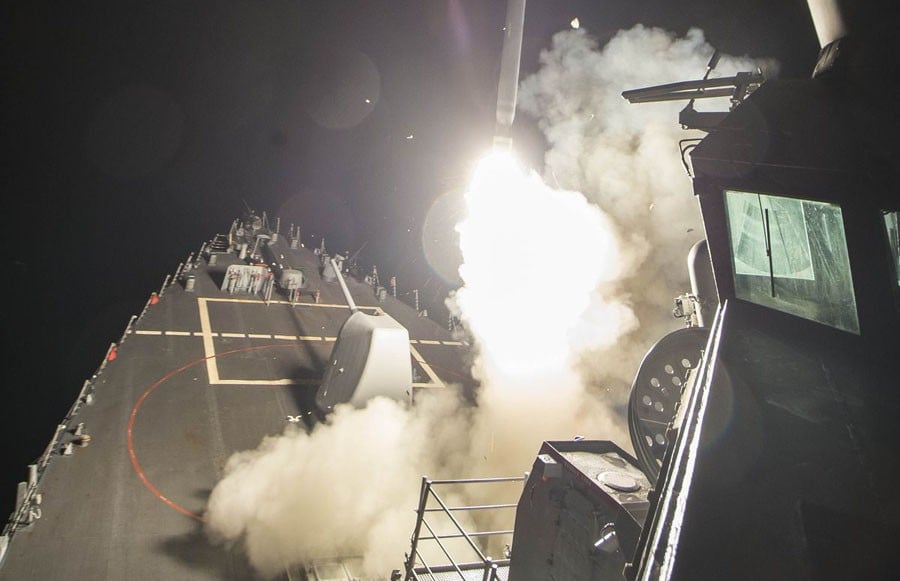

Candidate Donald Trump was mercilessly critical of Obama administration’s foreign policy in general, and especially towards Syria. Months before he decided to run for office, he decried that any intervention in Syria was not wise. "Many Syrian ‘rebels’ are radical jihadis. Not our friends and supporting them doesn’t serve our national interest. Stay out of Syria!" Trump tweeted in late 2013.
A couple of days later he noted again: "Don’t attack Syria -- an attack that will bring nothing but trouble for the US. Focus on making our country strong and great again!"
By then, conflicts in Syria had not escalated as they did later.
The perplexed Obama administration debated possible courses of action, including a unilateral offensive raid or authorisation from the Congress for punitive strikes against the Syrian government. President Obama had urged Bashar al-Assad to resign, but as frustration increased he warned that the use of chemical weapons would be a ‘red line’ that would change his calculus on intervening in the civil war.
The red line, however, kept shifting.
The civil war in Syria broke out with mass protests and a crackdown by the Assad government in 2011. In 2013, the regime used a gas attack on its own population forcing the United Nations to order Syria to account for and destroy its chemical weapons stockpile.
While Moscow offered guarantees, much to America’s relief, Syria became signatory to the Chemical Weapons Convention, prohibiting it from producing, stockpiling and using chemical weapons. However, Syrian opposition officials claimed that the regime retained unaccounted supplies. This claim later proved to be correct. The UNSC-authorised probe revealed in 2016 that it was Assad’s government using state machinery to deploy chlorine gas against its opponents, and that too in the civilian areas.
Quite puzzled with Daesh’s presence in Syria, the US launched airstrikes on the group’s strongholds in the country. Its attention had now diverted as action against Daesh superseded ousting Assad. The administration’s hands were still tied because of the lack of legislative backing.
Derek Chollet, former Obama administration official, told Forbe’s Doug Bandow, "The administration hoped its aid to insurgents would give Washington ‘leverage’ in dealing with its Sunni ‘allies.’ Yet the latter have manipulated America to serve their interests, pressing Washington to oust the Assad regime while supporting radical insurgent groups opposed by the US."
Many experts believed that Trump would ensure the US stayed out of Syria amid friendly relations with Russia. Donald Trump as a candidate for the Republican Party had realised the Syrian complexities and American limitations. The US could not occupy the country, impose a government and rebuild the Syrian state as such attempts had already failed in Iraq and Afghanistan.
More importantly, Assad’s ouster could actually empower more religious fundamentalists. Trump had said, "Our far greater problem is not Assad; it’s ISIS." Hence, during the campaign he promised that he would eliminate ISIS.
The Russian promise on Syria did not last. Along with China, it turned down the UNSC resolution authorising sanctions against the Syrian government for using chemical weapons. Resultantly, the April 4, 2017 nerve gas attack in the rebel-held province killed more than 80 people; which President Trump called the Assad government’s ‘heinous’ action. He had been in office for less than 100 days then.
Realising the vertiginous conflict erupting in the region, Trump declared that Assad regime had crossed "many, many lines, beyond a red line" with the suspected chemical attack, and thus ordered a direct assault on the Syrian airfields that launched those weapons. Turkey, Saudi Arabia, France, Italy and many other countries offered overwhelming support. The British Foreign Secretary even said that the UK might decide to aid the US in its air strikes against Syria, especially aimed at "monster" Assad’s government.
America under Trump, now, faces the same imbroglio all over again. "If President Trump broadens his aims against Assad, to establish civilian safe havens, for example, or to ground Syria’s Air Force, or to bring Assad to the negotiating table, he will enter the very morass that candidate Trump warned against. He would have to manage risks -- military confrontations with Russia, an intensified refugee crisis, a loss of momentum against ISIS -- that Obama studied at great length and concluded to be unmanageable, at least at a cost consistent with American interests," wrote Steve Coll, the dean of the Graduate School of Journalism at Columbia University.
Many experts are calling Syria a tragedy beyond America’s control. Others are asking Trump to get Congressional approval for the use of military force. Congress has its own set of suggestions that includes sanctions on the Assad, Iranian and Russian governments; whereas the administration has multiple voices struggling to explain its ‘evolving’ policy.
The US Ambassador to the United Nations, Nikki Haley, urged the UNSC to take strong action against the Assad regime. Meanwhile, White House Press Secretary, Sean Spicer, announced, "We’re not just going to become the world’s policeman running around the country -- running around the world." The Secretary of State, Rex Tillerson, had his own cents to add, "We’re asking and calling on Bashar al-Assad to cease the use of these weapons. Other than that, there is no change in our military posture."
In the midst of it, however, President Trump is the only one who has not taken any decision on the matter so far except stating that his attitude towards Syria and Assad has changed very much. ”You will see. They [Syria and Assad] will have a message. You will see what the message is,” he told reporters last week.
This is an updated version of the article that was published in The News on Sunday on April 23, 2017 .